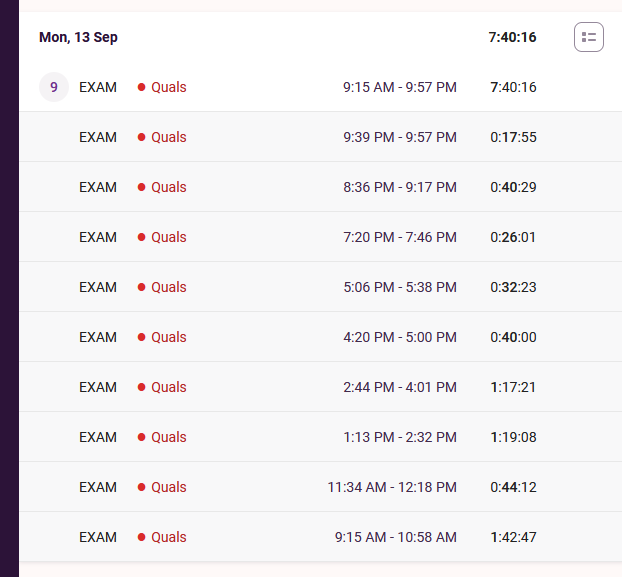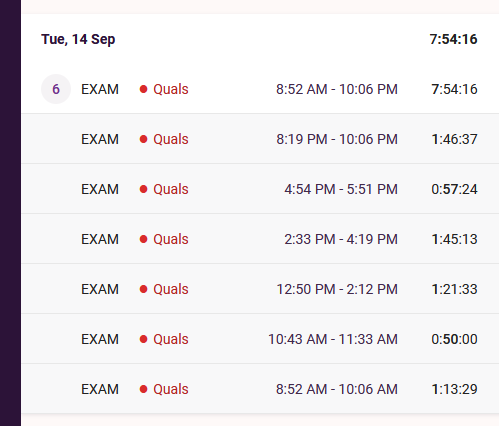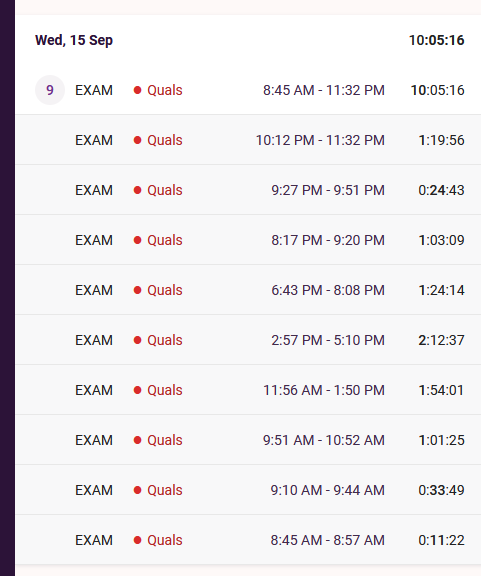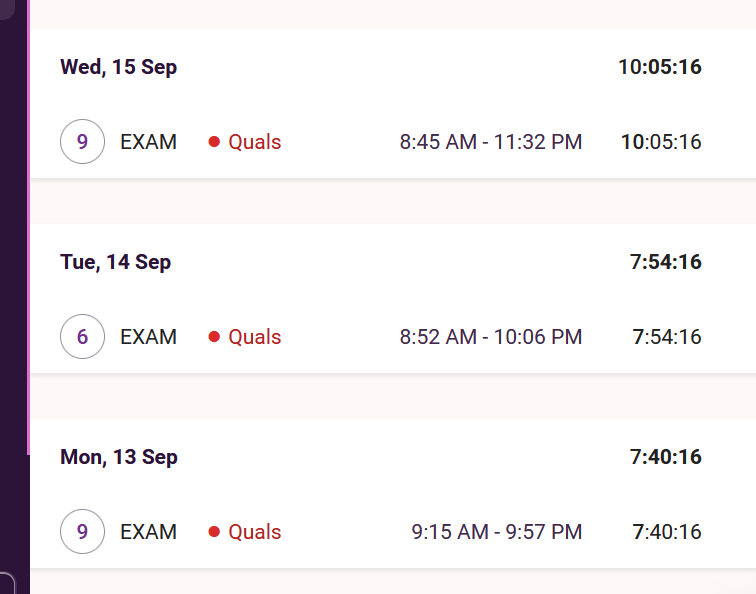I took my qualifying exams (“quals” for short) September 13-15, 2021. Then for the rest of September, I tried unsuccessfully to write about the experience. It took me four attempts – four separate word documents of brainstorming, notes, and partial drafts – to accept that I needed distance from the experience before I could write about it. Maybe I’d also needed a break from writing in general, after completing the academic gauntlet that required me to churn out 30 pages in three days.
What I’m sharing now is a three-part series on qualifying exams. The post you’re current reading is Part I, a mostly straightforward description of my experience. I tracked my writing time during the exam, so I include these charts just for fun. Before taking the exam, I would have loved to read about someone else’s experience, just to help me picture what the experience was like. Experiences with the qualifying exams vary greatly, but my hope is that this post is at least a little helpful for students who haven’t taken their qualifying exams and at least a little entertaining for those who have.
Part II is the angry post. Here’s where I move from descriptives to analysis. I give you my argument (spoiler: I think quals is trash), and provide some reasons why.
Finally, since academia ain’t changing anytime soon, Part III focuses on advice and tips. I share some blog posts I found along the way and useful tips I received from older students, but caution against thinking that there is any one-size-fits-all model. The argument of Part III is that qualifying exams are so individual that it’s difficult to provide universal advice, but you should pick and choose what sounds useful to you.
Background
Format
The format of qualifying exams varies widely, even with the same field. In this post, I’ll be talking about a written exam in a Sociology PhD program. In my department, students take their exams in one area (mine was in race and ethnicity) and have three readers: two chosen by the student, one assigned as a “generalist” reader. The exam itself lasts three days (72 hours), during which you need to answer three questions in 30 pages.
Preparation and Timeline
For context, not advice, here was my preparation process. I began creating my reading list in January 2021. I got some feedback as I created my list, which was based on previous students’ lists with my own “specialized interests” sections on multiraciality and whiteness. After I had a complete list, both my first and second reader gave feedback, telling me things like, “you have too many books” or “you should have X, Y, and Z articles on your list.”
Our list is expected to be 100 articles and 30 books. Since mine was book-heavy, I ended up with 84 articles and 44 books. (I could/should have cut down more.) I received final approval on my list in April 2021.
Since it was nearly summer by the time my list was approved, I could take on a heavier reading schedule than I would have during the school year. From this point on, I met with my first reader about once a month to discuss each section of my list. Not every first reader will do this and not every student wants this much structure, but I appreciated having deadlines. Getting through a 10-page reading list felt more manageable when I only had to focus on a couple pages at a time.
At the end of this period, in late August, I received practice questions and submitted one for my first reader to review. I outlined and wrote partial answers for a few more questions after this meeting, but never ended up doing as much as I’d planned. The weekend before my exam, I rested.
Exams
Day 1: A Rough Start
The night before my qualifying exams I didn’t sleep well. Consciously, I didn’t feel worried. I just wanted to finally get this exam over with. Subconsciously though, I was anxious enough to lose sleep. I suddenly developed a stuffy nose and had trouble breathing. (Thanks for the Vicks, JAMMMS.) I drifted in and out of sleep, woke up at 4am, and never fell fully back to sleep. At one point I dreamt that I’d gotten my questions and started the exam, only to wake up and realize I was still in bed. I managed to fall half-asleep by the time my alarm blared at 7am.
Rough night aside, I kept up with my usual routine. Coffee, reading (I started Honorée Fanonne Jeffers’s The Love Songs of W.E.B. Du Bois that day), and a little journaling (a writing warmup seemed like a good idea). I felt groggy and unprepared, but I logged into my email at 8:45 am, when I was supposed to get my questions from our graduate secretary, confirm that I’d received them, and start at 9:00 am. But technology had other plans.
Although they’d been sent to me, I never received my questions. I told myself this was a small inconvenience, nothing to stress over, as I called our office staff, who re-sent the questions and extended my exam end time by 30 minutes to make up for the delay. See? Nothing to stress over.
Opening the exam document, I saw that none of the questions were particularly unexpected. I had to answer one theory question and choose two out of four substantive questions. Two questions were nearly identical to my practice questions, but I hadn’t prepared for those and didn’t have a good argument in mind for either one. Cue guilt at not having prepared enough. It’s okay, this was a small thing. Nothing to stress over.
I’d received advice to answer the questions in order from hardest to easiest. That sounded good, and without a doubt, the most difficult question for me was the theory one. Sleep deprived and still telling myself I wasn’t stressed, I first struggled to even choose which questions to answer. I was intimidated by the question that would be the most straightforward but asked about my second reader’s area of expertise (which I considered my area of weakness). I felt like I should pick the practice question that I’d helped write (one part of my preparation over the summer), but in the moment, didn’t feel like I had anything good to say about the topic. So I spent the first few hours writing loose outlines of multiple questions, thinking about which readings I would focus on and whether I’d have enough to say about each question. Finally, I forced myself to choose three questions, and stepped outside for a walk.
The fresh air and sun were good but trying to psych myself up wasn’t working. I spent most of my 15-minute break recognizing that I felt like crying and convincing myself not to. Returning to my desk and beginning to write, I felt a little less panicked. I was getting words on the page, using some of my notes and snippets from practice question attempts. Still, the feeling of wanting to cry lingered and so I gave in, cried for a few minutes, and continued to write.
—
I won’t give an hour-by-hour description of the whole day, because there are only so many ways I can describe myself sitting and struggling to write. By 6pm, I was exhausted but couldn’t seem to finish the last page of my essay. When a friend I was texting suggested waiting a day to write the conclusion, I readily took her advice and stopped for the day.
Eating leftovers for dinner, I felt relieved and even a little bit hopeful, now that my first essay was (mostly) done. But I was also surprised at how emotionally exhausting this process was. Initially, I’d tried hard to stay positive, but it wasn’t lost upon me that the quality of my exam was so easily influenced by factors outside of my control, like whether I’d gotten a good night’s sleep.
I started to stew in the anger and bitterness that I’d been trying to suppress all day. This process felt completely unnecessary, ineffective as a method of assessment, and seemed to encourage terrible writing and unhealthy work habits. It was very clear that I wouldn’t be producing my best work or making any novel arguments, especially if I was sleep deprived again the next day.
But while closing out my many windows and tabs from the day, I saw the latest newsletter from Ida Yalzadeh’s tiny driver, a blog I’d recently started following. This one was about “eating the frog.” In it, Ida had written about struggling to turn her dissertation into a book. And somehow, reading about someone else struggling with their writing, their much more exciting writing, was encouraging and put things into perspective. It was helpful to think about how:
- People everywhere are struggling with writing.
- After quals, I would go on to struggle with better types of writing.
That night I passed out and had no trouble sleeping at all.

Day 2: Rhythm
To my relief, I woke up well rested. The sun was shining. This was going to be a good writing day.
And it was. Despite that dull hum of stress that I could never quite shake off and the fear that my final day could still be disastrous and ruin my whole exam…Day 2 was fine.
Well-rested and with a clear head, I started doing a few things differently. First, I did what I wanted, instead of what I thought was expected of me. Second, I trusted that what worked for me during a normal writing session would work during quals.
As I started in on coffee and breakfast, I fired off a few tweets, a small way to process the experience. I complained a little. I gave a shoutout to tiny driver. I felt less isolated. The day before, I’d worried that posting publicly on social media would give the impression that I wasn’t taking the exam seriously. Hadn’t I heard the stories about students who didn’t leave the same room for three days? But today, that sounded completely ridiculous. Maybe it was all the isolation we’ve endured since the start of the pandemic, but that approach wasn’t for me.
I drew on the tools that worked for me during more typical writing conditions. Big surprise!—turns out I know how I work best. For me, that meant, writing warmup memos, a lot of freewriting (rather than just outlines), and working in pomodoros. I was already tracking my writing time, so I only had to remember to set a timer.
Pomodoros
I started writing in 30-minute increments. Sometimes I hit a stride and would immediately reset the timer and keep writing. Other times, the timer was a reminder to stand up and stretch. Later in the day, when I struggled to stay focused or was naturally tired, I sometimes wrote for only 15 minutes at a time, to make the work feel more manageable. But usually, I stuck to 30 minutes; it helped me understand how much time was passing. I might feel like I’d been writing forever, only to check my phone and see that only 10 minutes had gone by. Other times, I’d realize I’d been sitting for an hour and a half, so it was a good idea to stretch and drink some water.
Freewriting
Pomodoros were helpful; freewriting saved me. Several prolific writers, from Toni Morrison to William Zinsser, have acknowledged that writing is thinking. We often figure out what we want to say by writing. Some people may more naturally process ideas internally or verbally, but I already knew that I process best through writing.
Looking back at my notes from the first day, I realized none of my rough outlines were very useful. I needed more than list with five bullet points. So for this second essay, I spent a lot of time doing some very messy writing. I rambled in several different directions to see if I had anything interesting to say. I let myself focus on planning and ideas, and tried to trust that I could put them into a legible format later.
I ended up freewriting and planning until 2pm. And this was terrifying. I’d used up all of my “prime” writing time (the morning) on prewriting and I still had to complete 10 pages today, so that I could wake up the next morning and write 10 more pages on another topic. Part of my energy went toward suppressing/willfully ignoring this panic.
Nothing to stress over.
Nothing to stress over.
Nothing to stress over.
In actuality, a lot of my “freewriting” made it into my paper. And calling it “freewriting,” rather than thinking of it as the “real” draft, took away some pressure.
Breaks
Writing (the idea generating part) also happens when you’re away from the page and your brain has space to think. I thought taking quick walks around my apartment complex or laying on my couch would help me think through ideas and parts of the paper I was struggling with. Nope. When I took breaks, I completely checked out. I settled into trying to keep a clear separation between work times and break times; focused pomodoros for work and zombie-like brain activity during breaks.
So much of the process was unnatural and went against how I naturally work. My motivation would tank in the afternoons, when I’d be naturally tired and only doing mindless work (not writing), and in the evenings, when I’d typically be winding down and relaxing (not writing). I thought the constrained timeline of quals would motivate me, but anger and cynicism about the entire process won out over deadline panic, at least on Day 2.
Once again, I left the final page of this essay for future me to deal with and ordered takeout, paid for by a generous friend.
I was relieved that Day 2 had gone relatively well and that external conditions, like being well-rested, had worked out in my favor. Still, I was nervous that something would happen on Day 3 that would throw me off and make writing more difficult. And right before bed, my period started.
If this particular period came with bad cramps, I was going to be so mad.

Day 3: Finally
I didn’t get bad cramps, just regular ones. Count your blessings, I guess.
On this final day, I had to write my third essay, write the last pages/conclusions for my first and second essays, and revise them all. Especially the first essay, because I knew it was a mess.
No time to waste. The pomodoros flew by. As a small incentive, I made a mid-morning coffee run to the nearest cafe and bought their most expensive latte. A couple of friends had told me they were willing drop off coffee, but getting outside to take a break was its own reward. Later, the caffeine and sugar hit in a good way and that boost of energy carried me through the early afternoon.
—
I finished the third essay around 5:00pm. Cue surge of hope, followed by dread at remembering that I hadn’t finished the first or second essays.
But revising turned out to be the smoothest part. After producing new writing for the past three days, revising drafts was a much easier task. I was the most focused I’d been during the entire exam. This process was also about being pragmatic, since I no longer had time to worry about changing my ideas or making a creative argument.
Although I had until 9:30am the next day, I finished just before midnight.
I texted friends and family, turned on some music, and celebrated with wine and dancing.


2 thoughts on “Qualifying Exams I: How It Went”